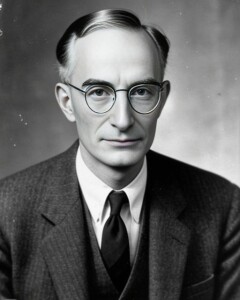J. Robert Oppenheimer, a prominent American physicist widely recognized as the “father of the atomic bomb,” played a pivotal role in the development of nuclear weapons during the turbulent era of World War II. Born on April 22, 1904, in the vibrant city of New York, Oppenheimer exhibited remarkable intellectual prowess from a young age. He embarked on his academic journey at Harvard University, immersing himself in the study of physics. Subsequently, he pursued his Ph.D. at the esteemed University of Göttingen in Germany. Oppenheimer’s scientific career soared when he joined the distinguished faculty at the University of California, Berkeley, making significant contributions to the field of theoretical physics, with a particular focus on the enigmatic domain of quantum mechanics. However, it was his unwavering commitment to the Manhattan Project that irrevocably altered both his own life and the course of history.
In 1942, Oppenheimer was appointed as the esteemed scientific director of the covert and classified Manhattan Project, a highly secretive government initiative aimed at unraveling the enigmas of atomic energy and harnessing its enormous potential to create an atomic bomb. Under his exemplary leadership, a group of brilliant scientists and engineers worked tirelessly, united by the common objective of unraveling the complexities of nuclear fission. Oppenheimer’s exceptional organizational skills and ability to bring together individuals from diverse disciplines proved pivotal in the project’s resounding success. Armed with his unparalleled intellect and profound insights into the realm of physics, he expertly navigated numerous scientific obstacles with determination, each challenge only enhancing his unassailable reputation.
Amidst the weighty pressures and profound moral dilemmas associated with the development of such a devastating weapon, Oppenheimer’s unwavering dedication to his craft remained intact. The momentous and historic Trinity test in July 1945 stands as an indelible turning point in human history. The successful detonation of the first atomic bomb symbolized the unleashing of unparalleled destructive power, ultimately leading to the bombings of Hiroshima and Nagasaki in Japan, hastening the end of the cataclysmic World War II.
Nevertheless, Oppenheimer’s involvement in the Manhattan Project cast a shadow of ambiguity over his previously illustrious legacy. After the war, he emerged as a staunch advocate for international control of atomic weapons, expressing fervent concerns about the perilous arms race that loomed. Unfortunately, Oppenheimer’s progressive views and perceived associations with politically left-leaning groups during the McCarthy era inevitably resulted in accusations of disloyalty and alleged sympathies with communist ideologies. In 1954, he underwent a highly charged security hearing and, despite his invaluable contributions to national security, unjustly had his security clearance revoked.
Undeterred by these personal and professional setbacks, Oppenheimer tenaciously continued to make exceptional contributions to the scientific community. He resolutely returned to his true passion, teaching and engaging in research at the prestigious Institute for Advanced Study in Princeton, where he nurtured and mentored a forthcoming generation of physicists, leaving an indelible imprint on the realm of knowledge. Beyond his groundbreaking scientific achievements, the profound impact of Oppenheimer’s intellectual brilliance, inspiring leadership, and unwavering commitment to the ethical dimensions of scientific inquiry resonate through the annals of time.
The life and work of J. Robert Oppenheimer epitomize the intricately woven tapestry of science, politics, and morality. While his role in the development of the atomic bomb remains a contentious subject, his broader contributions to the advancement of physics cannot be easily dismissed or overlooked. Oppenheimer’s legacy serves as an enduring reminder of the immense power and weighty responsibility that inevitably accompany scientific breakthroughs, compelling us to continuously consider the ethical implications that underlie every action we undertake.

